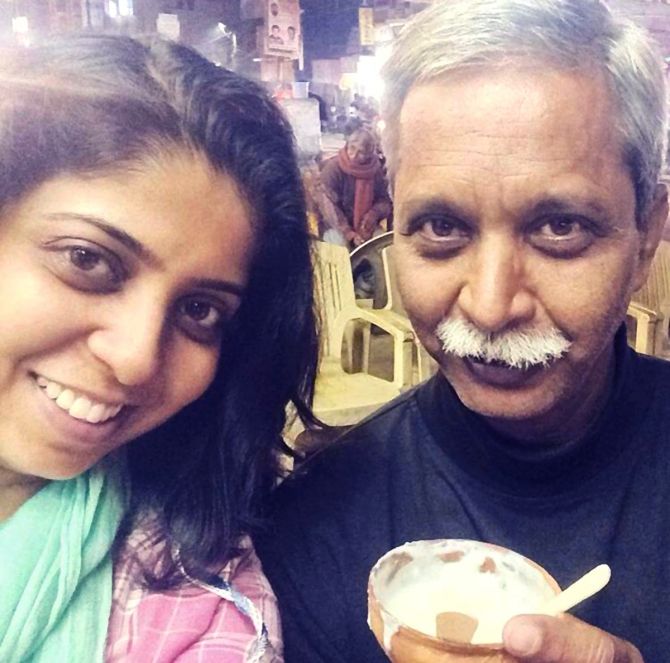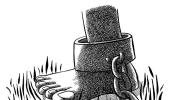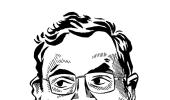'The wrong person had to spend a banvaas of 14 years on a wrong charge.'
Jyoti Punwani reports.

In December 2007, the Uttarakhand police charged former journalist and activist Prashant Rahi with sedition, waging war against the State, conspiracy, and for being a Maoist. UAPA was also applied on him.
A full 14 years later, on January 7, 2022, Rahi and his 3 co-accused were acquitted of all charges by Udham Singh Nagar Sessions Court Judge Prem Singh Khimal.
The case, tom-tommed as a 'major strike against Naxalism in Uttarkahand' fell apart because the police simply could not produce any evidence.
Of the three independent witnesses they produced in court, one turned hostile; and serious discrepancies and contradictions emerged in the cross-examination of two other independent witnesses.
Further, the policemen themselves contradicted one another in their depositions. Even procedural requirements were not met in a case touted as so important.
In 2013, when Rahi, an MTech from the Banaras Hindu University, was out on bail, he was again arrested, this time by the Maharashtra police in a separate case, again on charges of being a Maoist.
In this second case, he was convicted along with Professor G N Saibaba and four others by a Gadchiroli court in 2017, and is currently serving a life sentence in Amravati jail in solitary confinement. The final appeal against the conviction is pending.
***
Rahi's daughter Shikha, a Mumbai-based film-maker, who organised a campaign in Uttarakhand to prove her father's innocence, was overjoyed with the acquittal in the Uttarakhand case. However, when the verdict was announced she couldn't help crying because she saw, through video-conferencing allowed by the Supreme Court, her father on a stretcher.
He was suffering from sciatica and as appears to be the practice in Maharashtra's prisons, had not been taken to hospital.
"I was angry that the State had deprived me of relishing the moment we were all waiting for through these last 14 years," Shikha told Rediff.com.
Shikha revealed that final arguments in the 2007 case had been completed thrice before three previous judges. But none of these judges delivered a judgment, and were eventually transferred.
Judge Khimal was the fourth judge to hear the final arguments. The last two times, the final arguments were conducted by Delhi-based advocate Trideep Pais.

***
In 2011, while out on bail, Rahi had told this reporter that he had been tortured badly by the Uttarakhand police. But in jail, he was spared manual labour because he was seen as an "atom bomb" who could not be allowed to mingle with others, and was hence put in solitary confinement.
But the police failed to convince Judge Khimal about the culpability of this "atom bomb".
Among the three independent witnesses who deposed at the trial, one was a forest ranger.
The police said that after his arrest, Rahi had led them to a black plastic tent pitched in the middle of the forest near the historic town of Nanakmatta in Uttarakhand. There, hidden under some bushes, they recovered a laptop, a CD, a pen drive and some literature.
However, in cross-examination, the forest ranger, who had accompanied the police on their request, told the court that he had seen no black tent. The forest guards too had not informed him of any such tent, he added.
This was a reserved forest area, hence not just forest guards, but even villagers would inform them of any suspicious activity, he said. But he had received no such information.
The cross-examination of another independent witness also cast doubt on the police version.
This witness' statement under Section 164 had been recorded before a magistrate, and was dated February 2008. In that statement, he had said that six months earlier, in October 2007, he had seen outsiders in the forest.
However, deposing under oath in court, this witness gave the year in which he had seen outsiders in the forest as 2004. He maintained even in cross-examination, that the police had taken his statement in 2004 and had taken him to the magistrate 15 days later.
Such a glaring contradiction in the testimony of an independent witness rendered his testimony of no value, felt the judge.
The third independent witness was declared hostile after he contradicted his statement given to the police. His police statement said that he had seen outsiders in the forest. However, in court, he said he had not seen any outsiders in the forest nor could he recognise the accused present in court.
This witness admitted that his statement to the police had been given under threat by the police.
The judge also found it hard to believe the police version of Prashant Rahi's arrest. They claimed that when they went to apprehend Maoists who were reported to be holding a camp, four of the alleged Maoists ran away and only one, Prashant Rahi, could be caught.
This 7-member police party, pointed out the judge, armed with a revolver and two rifles, could apprehend only one of five unarmed alleged Maoists.
Rahi maintained in court that he had been picked up on December 17 from Dehradun, and was falsely shown as arrested 5 days later.
Though the police claimed that banned literature had been recovered from Rahi, they could produce no notification to show that this literature was on the banned list.
The police also alleged that a CD recovered from Rahi had a video of Haridwar jail, and the accused had planned to help alleged Maoists Neelu Vallabh and Anil Chaudakoti escape from there.
However, the CD was recovered in December 2007; by then, these two alleged Maoists were already out on bail. Moreover, the police admitted that the video showed nothing about planning a jail break; it only showed the wall of the jail.
Similarly, the police's lapses in procedure: Failure to conduct a Test Identification Parade of the accused; and failure to get the central government's permission to prosecute the accused under UAPA, led to the collapse of the case.

***
"We knew there was no evidence worth the name," said Advocate A D Massey, who had represented Rahi throughout and conducted final arguments before the first two judges who heard the case.
"But Uttarakhand has the highest conviction rate in the lower courts," he added. "We thought even if they are convicted in the lower courts, we will surely get an acquittal in the higher court. Hence it is very significant that we managed an acquittal in the lower court itself."
"The wrong person had to spend a banvaas of 14 years on a wrong charge," said Massey regretfully.
For Shikha, these 14 years have seemed endless. "I was 24 when my father was arrested," she recalled, "and my father was only 48. He is now 62 and has to spend his years in an anda cell with no facilities, let out only every alternate day."
"Politicians and industrialists file defamation cases at the drop of a hat," said an angry Shikha. "If I had the resources they do, I too would sue the State for conspiracy against innocents."
Feature Presentation: Aslam Hunani/Rediff.com











 © 2025
© 2025